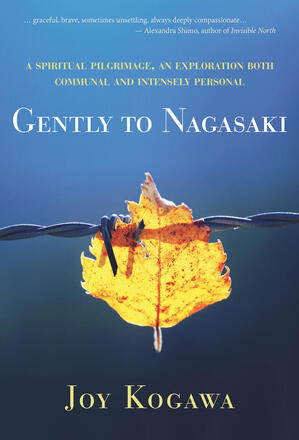
Gently to Nagasaki
Description
Gently to Nagasaki is a spiritual pilgrimage, an exploration both communal and intensely personal. Set in Vancouver and Toronto, the outposts of Slocan and Coaldale, the streets of Nagasaki and the high mountains of Shikoku, Japan, it is also an account of a remarkable life. As a child during WWII, Joy Kogawa was interned with her family and thousands of other Japanese Canadians by the Canadian government. Her acclaimed novel Obasan, based on that experience, brought her literary recognition and played a critical role in the movement for redress.
Kogawa knows what it means to be classified as the enemy, and she seeks urgently to get beyond false and dangerous distinctions of "us" and "them." Interweaving the events of her own life with catastrophes like the bombing of Nagasaki and the massacre by the Japanese imperial army at Nanking, she wrestles with essential questions like good and evil, love and hate, rage and forgiveness, determined above all to arrive at her own truths. Poetic and unflinching, this is a long-awaited memoir from one of Canada's most distinguished literary elders.
Awards
- Short-listed, Hubert Evans Non-Fiction Prize - BC Book Prize 2017
Reviews
"Gently to Nagasaki is a mature work of history and spirituality; bravely detailing the intersection between mass global evils and those perpetrated intimately by members of one's own family. Kogawa's memoir deeply explores how denial works in regards to racism, pedophilia, nuclear power, Canadian internment camps and Japanese war atrocities. It reveals how, in the midst of betrayal, there is still a place for trust."
—Douglas Todd, Vancouver Sun spirituality, diversity and migration columnist
“With a poet’s eye for beauty, Kogawa offers an intimate take on how she has coped with the seismic events that have shaped her life including the internment of the Japanese Canadians, their fight for their redress, and the bombing of Hiroshima and Nagasaki. The result is a graceful, brave, sometimes unsettling, always deeply compassionate account of what it means to live a just and kind life in troubling times.”
— Alexandra Shimo, Invisible North: The Search for Answers on a Troubled Reserve
“Joy Kogawa treats her intensely confessional spiritual journey through the intimately personal and prophetically public subjects in this book. … With the life-long prolific and poetic writings behind her, she brings this memoir to the world as she shares her eventful earth journey that is her spiritual home.”
— Fumitaka Matsuoka, Author and Professor of Theology at Pacific School of Religion and the Graduate Theological Union, Berkeley, California
“Gently to Nagasaki ultimately offers a sobering treatise on the nature of some wounds: we can carry them with us long after their surface has healed and the pain they cause might never fully disappear.”
— Brett Grubisic, Macleans
“Experimental in style, incorporating fragments of poetry, letters and journal writing, Gently to Nagasaki encompasses a wide variety of topics ranging from Christianity and Japanese history to climate change and nuclear power. It sometimes reads less like a memoir than a collection of loosely interwoven essays.”
— Leslie Shimotakahara, The National Post
“One of the most important memoirs in recent Canadian literature. It brings together personal and political anguish and washes them with words and the waters of mercy.”
—Mary Jo Leddy, CM, Canadian writer, speaker, theologian and social activist
"In her truth telling of both personal and communal events that brought shame, betrayal, anger and suffering into her own life as well as into many Japanese lives, she strikes a cord that resonates with the reader in our shared experience of what it means to be human. But rather than leaving the reader in the slough of despond, she also addresses the healing qualities of reconciliation, trust and thanksgiving. Her story ends with the image of a cleansing and abundant waterfall—a sure symbol of hope and joy.”
— The Very Reverend and Honourable Lois Wilson
“As a writer of memoir, she is taking full-ownership of the material, de-storyfying it, as it were, by revealing her troubled journey through life. Her gaze is unflinching as she confronts the impact upon herself of her double-shame — the facts, the history, the emotions are all laid bare.”
— M.A.C. Farrant, The Vancouver Sun
“In the spirit of breaking the us/them dichotomy of victimization, Kogawa airs many attitudes with which the reader might disagree. Disagree and read on: Conciliation is the reward for those with the patience to work through their discomfort.”
— Jade Colbert, The Globe and Mail

